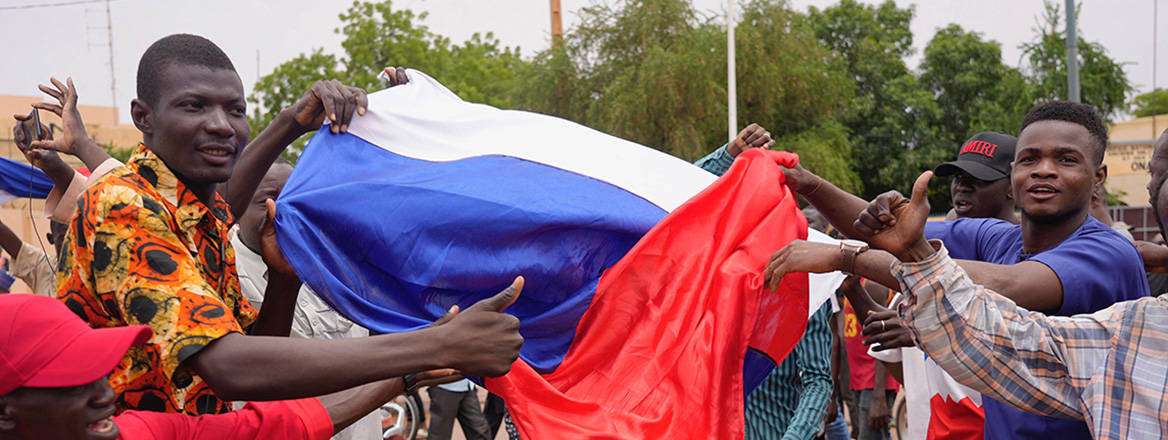RUSI
|
|
What Next for Wagner’s Information Operations?
The Wagner Group’s information operations team, which has played a key role in the group’s activities in Africa, appears to have survived the death of Yevgeny Prigozhin – albeit in a reduced form.

What became known as the Wagner Group started to become involved in information operations back in 2013, when former leader Yevgeny Prigozhin’s Patriot Media (part of Concord Company) was being set up. From there, the notorious Project Lakhta (aimed at interfering in the politics of the US and other Western countries) sprang up, directed by Evgenyi Zubarev and eventually involving 11 media organisations and 150 media partners. Wagner’s information operations went well beyond that, however, and arguably had their biggest impact in Africa.
From the start, according to a source within Wagner’s media operations, the idea was to combine and create synergies between Wagner Group’s self-promotion in new markets and pro-Russian propaganda. The concept reportedly came from the Russian intelligence services. At least until the 2023 mutiny, Wagner would not venture into information operations that were not explicitly approved by the Russian government. Exemplary in this regard is Syria, Wagner’s first major military operation, where it only used social media for recruitment purposes. Sources internal to Wagner allege that the group advocated a social media campaign in Syria too, but the Russian government was not interested and hence it did not happen.
By leveraging the voices of local influencers, Wagner has sought to subtly shape African public opinion to be more favourable towards Russian actors
Wagner has been able to mount effective information operations in Africa by relying on local actors. Mapping financial relationships is complicated by the parallel role of Russian entrepreneurs or state agencies financing the media and by the attitude of media actors, who often jump on the bandwagon and redistribute content with no political motivation. In terms of shared content, however, we know that Wagner relied largely on local partners such as Afrique Media TV, Radio Révolution Panafricaine, Radio Longo Songo and the websites Mali Actu, Maliweb and Malijet to deliver Wagner- and Russia-friendly media content and to counter Western narratives. Panafricanist groups and individuals figured prominently among the beneficiaries of Wagner’s support – they have been promoting increased Russian presence as a tool for ending what they perceive as French neo-colonialism in Africa. The source inside Wagner acknowledges that the information operations team sub-contracted African companies to do media and social media work on its behalf, and also paid individual journalists and influencers.
By leveraging the voices of these influencers, Wagner has been seeking to subtly shape African public opinion to be more favourable towards Russian actors. For example, Kemi Seba, a radical Panafricanist associated with the Nation of Islam, started working with Wagner in 2018. Seba reportedly received $440,000 from Wagner during the period of his collaboration with the group, according to Nicolas Quénel. He was seen by Wagner not as organic to its operations, but as somebody whose interests were aligned. Our source in Wagner’s information operations team commented that Panafricanists like Seba ‘are delivering the exact messages that Wagner and the Russians want’, but ‘they are not just working for the Russians and for the Wagner Group, they are working for their own people’, meaning that they have their own political aims. The link to Wagner is therefore ‘not strong’ and is based on financial incentives. According to Lou Osborn’s and Dimitri Zufferey, Prigozhin intended to turn Seba into a major Panafricanist figure aligned with Russian interests. Seba seemed reluctant to accept Wagner’s embrace fully, however, and started making statements that he did not intend to become a Russian or Wagner asset. Later Seba stated that he had cut off links, alleging that Prigozhin had asked him to carry out violent actions.
Until the mutiny of 23 June 2023, the Russian authorities were happy for Wagner to be running its media and social media campaigns without much supervision; they reportedly never interfered with the content of its campaigns. After the mutiny, the activity of the information operations team stopped for a mere 24 hours, before resuming as if nothing had happened. However, on 30 June Prigozhin announced the dissolution of the Patriot Media Group, which he had established in 2019. After Prigozhin’s death two months later, the information campaigns teams based in Africa remained operational, and most campaigns continued, but at a reduced pace. Funding was cut, and even Radio Longo Songo in the Central African Republic, a pillar of Wagner’s media campaigns in Africa, was forced to operate at reduced capacity, according to Osborn and Zufferey.
Most Russia-based teams were disbanded, frozen or taken over. Overall, activity declined considerably. Wagner also stopped working closely with Russian TV and radio, after the Telecom ministry warned the latter to stop such cooperation. Most of the Wagner staff working on the VK platform in Russia were detained by the Russian authorities, according to the source within Wagner.
Relations between the Wagner Group and the Russian authorities have improved during 2024, however. The fact that the information operations team had not come out in support of the mutiny might have played in its favour. As of July 2024, the team was hoping that the Russian government would reconnect with it and start tasking it with social media campaigns again, according to one of its members. At that time, there was no Russian government plan to take what was left of the information operations team away from Wagner and set it up as a separate entity. The Wagner Group in any case plans to continue its information campaigns regardless of whether the Russian authorities support them or not.
The fact that the information operations team did not come out in support of Prigozhin's mutiny might have played in its favour
Our source says that the information operations team was never primarily meant to make a profit for Wagner, but to smooth its way into new projects, support existing contracts, and facilitate staff recruitment. It did contribute to earning cash for Prigozhin’s conglomerate as part of Wagner’s contracts with the Russian Ministry of Defence by spreading pro-Russia propaganda, but its role in this was very minor. In other words, information/disinformation campaigns were originally conceived merely in support of Wagner’s core businesses. After the mutiny and the loss of much of its previous business, however, according to an internal source, Wagner offered its social media campaigning skills and capabilities to foreign governments such as those of China and some Arab states; discussions apparently took place, although seemingly without results so far.
The resurgence of Russian government interest in the group’s information operations suggests in any case that replacing its media and social media campaigns in Africa might have proven harder than initially expected. The working agreements reached between Wagner and the Russian Ministry of Defence in Mali and the Central African Republic have helped to create the conditions for resuming close collaboration even in the field of information operations.
The views expressed in this Commentary are the author’s, and do not represent those of RUSI or any other institution.
Have an idea for a Commentary you’d like to write for us? Send a short pitch to commentaries@rusi.org and we’ll get back to you if it fits into our research interests. Full guidelines for contributors can be found here.
Original article link: https://rusi.org/explore-our-research/publications/commentary/what-next-wagners-information-operations


